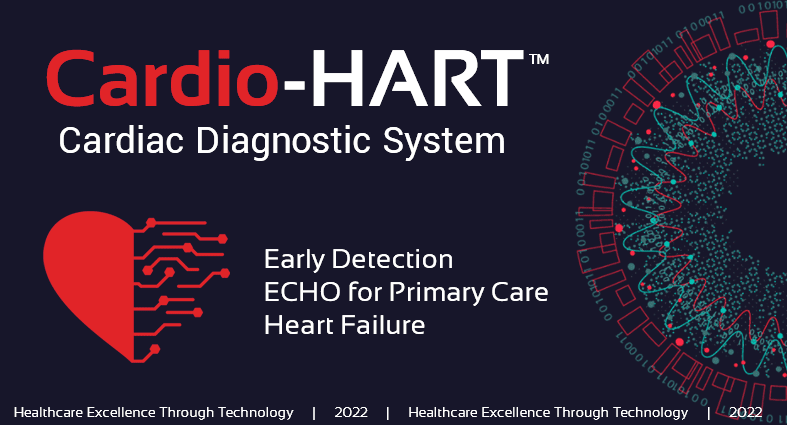The HETT show 2022 has been successfully finished for Cardio-Phoenix Company. We spoke with Marc, CEO and Founder of Cardio-Phoenix, about the experience and expectations after the show.
Q: Tell us a bit about how your organization currently supports the health and care sector.
Marc: The NHS’s long-term plan of 2019 identified early detection of heart disease as one of its primary goals. This is what Cardio-HART does, and much more.
We’re currently engaging with various NHS institutions to evaluate CHART in real-world situations.
We’ve partnered with Eastern AHSN to help us address some stubborn unmet needs, such as the lack of a suitable device for the early detection of CVD, including heart failure and Valve diseases.
Q: With your experience, what are some of the biggest challenges that you have identified when working closely with your NHS/Care partners?
Marc: Unicorns! Yes, seriously, trying to explain to someone who has never seen the beauty of a unicorn just how beautiful a unicorn is. They just don’t believe that unicorns can exist. Their world is still flat… the most common comment we get when trying to present our breakthrough technology are the words “that’s not possible!” and “…such a device does not exist!” They have to see it to believe it, and even then… Their world is fixed; they cannot see there is not just a better way, but a much better one that surpasses all they currently believe in.
Yes, seriously, trying to explain to someone who has never seen the beauty of a unicorn just how beautiful a unicorn is. They just don’t believe that unicorns can exist. Their world is still flat… the most common comment we get when trying to present our breakthrough technology are the words “that’s not possible!” and “…such a device does not exist!” They have to see it to believe it, and even then… Their world is fixed; they cannot see there is not just a better way, but a much better one that surpasses all they currently believe in.
But, when they finally realize what they are looking at, there is nothing so majestic to feast the eyes as a unicorn.
Q: Pertinent points mentioned. Tell us how working with your products and solutions can help tackle some of the challenges that exist within digital health.
Marc: Unmet diagnostic needs are everywhere and everywhere hidden, as care providers try to work around the limitations of existing technologies and the need for the capabilities of inaccessible technologies. In our space, the gap that exists between what ECG can diagnose and what Echocardiography can diagnose. ECG has limitations, yet despite the there is widespread disregard for those limitations, they have adapted to them, such that there is actual comfort in the fact that it’s been in use for so long. Sure, some have thrown AI at it to improve its capabilities, but it’s nothing more than putting lipstick on a pig. It’s still an ECG, glossed over, accepted as the standard. Comfort food!
But Echo takes heart diagnostics to another dimension; it can diagnose many significant diseases that ECG cannot.
So using ECG in primary care, means most of significant heart diseases, cannot be detected.
But Echocardiography requires a specialist to conduct the examination, and a specialist to report the results. It’s not a tool suitable for primary care.
Enter the Unicorn! Now imagine a device that gives you 100% AI reporting ECG and 90% of the capabilities of ECHO. Now add wings in the form of 100% Phonocardiography, and your unicorn is a winged Pegasus able to include valve disease, and murmurs as well.
So why is this a flying unicorn, because the test is basically the same as an ECG test. Same nurse, same setting, same wires, only one tiny change, 4 additional sensors. That’s it!
But this flying unicorn is far more than ECG; it is substantially equivalent to Echo, but not quite Echo. Yet it should be used where Echo is not available, as it can provide similar Echo findings to Echo, making it easy to determine patient cardiac status, much like an echo.
Critically, it can help determine when Echo is really needed, by this I mean when a cardiologist should be involved.
Its intended use is primary and secondary care, wherever Echo functionality is needed, but might not be available.
It’s Echo for Primary Care,
It’s Pre-Echo for secondary care.
It’s a winged unicorn!
Q: What do you expect from the HETT show next year?
Marc: Next year I want to hear from the care providers that are using Cardio-HART, their patient stories, survival stories of heart failure diagnosed early, of no valve disease present confirmed in 15 min without need for a 6-9 month wait for Echocardiography. Stories from the emergency room, where doctors could triage gastritis from heart attack. Stories from pre-surgery, catching that patient ECG missed with a condition that would have put them at risk during surgery, of cancer patients, where treatment could continue because it was not causing heart failure… and most of all, from cardiologists, who have been able to identify patients that did not need echo… allowing them to focus on patients that really need them.
We recommend the "Cardio-HART" brochure.









